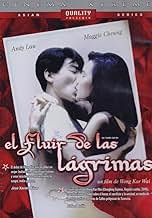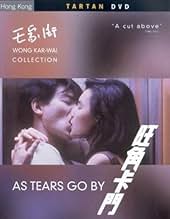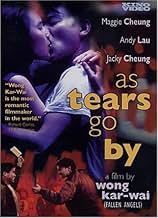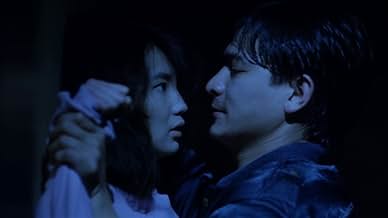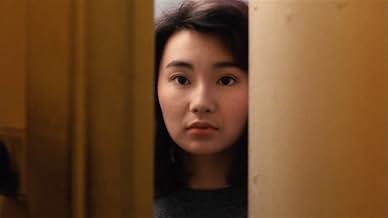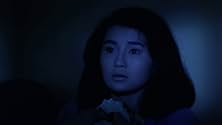AVALIAÇÃO DA IMDb
7,0/10
13 mil
SUA AVALIAÇÃO
O gângster Wah se apaixona por sua bela prima, mas também deve continuar a proteger seu parceiro volátil no crime e amigo, Fly.O gângster Wah se apaixona por sua bela prima, mas também deve continuar a proteger seu parceiro volátil no crime e amigo, Fly.O gângster Wah se apaixona por sua bela prima, mas também deve continuar a proteger seu parceiro volátil no crime e amigo, Fly.
- Prêmios
- 2 vitórias e 10 indicações no total
- Direção
- Roteiristas
- Elenco e equipe completos
- Produção, bilheteria e muito mais no IMDbPro
Avaliações em destaque
No better one day film school can be found in watching "Mean Streets" and then this.
Superficially they seem the same and Kar-Wai has told us that he patterned this, his first feature after Scorsese's first.
Here's the lesson: Scorsese belongs to a school of thinking where actors create characters, real extreme and powerful characters. These characters literally create the situations around them. The filmmaker's job is to attach the camera to the characters. Nearly all Italian and Italian-American filmmakers believe this. This is fine if you can live on espresso, but most of us in a film life need something to sustain us.
Kar-Wai in his later films is clearly in another camp. He literally starts with no script. He creates a cinematic tone. Into that tone is spun a place and his actors are expected to find their way within it. Only then do we see characters, and the camera is never, ever glued to personalities.
It is a world of difference, as different as people who can talk only about other people contrasted to those who can create another world in a conversation.
Sooner or later, all lucid watchers must make a choice about how big their film universe can be. This was Kar-Wai's beginning. It is hard to see unless you know his later stuff. But it is there, like the pollen in the air.
Ted's Evaluation -- 3 of 3: Worth watching.
Superficially they seem the same and Kar-Wai has told us that he patterned this, his first feature after Scorsese's first.
Here's the lesson: Scorsese belongs to a school of thinking where actors create characters, real extreme and powerful characters. These characters literally create the situations around them. The filmmaker's job is to attach the camera to the characters. Nearly all Italian and Italian-American filmmakers believe this. This is fine if you can live on espresso, but most of us in a film life need something to sustain us.
Kar-Wai in his later films is clearly in another camp. He literally starts with no script. He creates a cinematic tone. Into that tone is spun a place and his actors are expected to find their way within it. Only then do we see characters, and the camera is never, ever glued to personalities.
It is a world of difference, as different as people who can talk only about other people contrasted to those who can create another world in a conversation.
Sooner or later, all lucid watchers must make a choice about how big their film universe can be. This was Kar-Wai's beginning. It is hard to see unless you know his later stuff. But it is there, like the pollen in the air.
Ted's Evaluation -- 3 of 3: Worth watching.
I'm by no means a Kar Wai Wong aficionado; I've only seen 2 of his films (this and his follow-up feature "Days of Being Wild"). But from what I've seen, this is the best place to start.
Kar Wai Wong films are very artistic, and from a technical perspective they are downright miraculous. However, as is the case with many artistic directors, an over emphasis on art can result in losing the audience. After all, not everyone is able to grasp the totality of a film in just 90 minutes. That said, if I had started with "Days of Being Wild" or even one of his more abstract creations I may have been lost.
"As Tears Go By" is an excellent way to dip your toes in the pool. While it is rich with visual poetry, it is not so complex that it loses its audience. It has a linear story which uses explosive scenes of violence to keep us awake, and at the same time there is a gentle & poetic undercurrent. The story is about a young man who is involved in the criminal underworld, and his life is torn between 3 elements: duty to his bosses, loyalty to his friend, and a hope for love with a mysterious girl who drifts into his life.
It is an age-old theme, but it's always worth exploring because it cuts to the heart of who we are as humans. Within this story are powerful doses of rage, humility, fear and hope. What may separate this film from others is the way the main character wants to do the right thing. Sure, he's a tough guy, but he's not beyond rationality and knowing when to get the heck outta dodge. The question is, will life/fate allow him to do the right thing?
Although I feel that Kar Wai Wong's "Days of Being Wild" is a superior cinematic achievement, I think "As Tears Go By" has a more direct connection with the audience simply because the main character is very human and likable. Also his sidekick "Fly" is very funny. Good humor is rare in a lot of art films, but it's not lacking here.
I would compare "As Tears Go By" to another excellent film, Michael Mann's "Heat" with Robert De Niro playing the thief torn by the same 3 elements: duty, friends and love. Another good one is the Chinese film "The Drummer" about a gangster's son torn by which path to take: his father's (violent) or his sister's (caring). To me, the best in the genre is Takeshi Kitano's "Hana-Bi" (Fireworks) which really shows the bipolar life of a violent man who is deeply in love with his wife. If you liked any of these films, I think you'll enjoy "As Tears Go By". Similarly, if you like ATGB, check out the others I mentioned.
Kar Wai Wong films are very artistic, and from a technical perspective they are downright miraculous. However, as is the case with many artistic directors, an over emphasis on art can result in losing the audience. After all, not everyone is able to grasp the totality of a film in just 90 minutes. That said, if I had started with "Days of Being Wild" or even one of his more abstract creations I may have been lost.
"As Tears Go By" is an excellent way to dip your toes in the pool. While it is rich with visual poetry, it is not so complex that it loses its audience. It has a linear story which uses explosive scenes of violence to keep us awake, and at the same time there is a gentle & poetic undercurrent. The story is about a young man who is involved in the criminal underworld, and his life is torn between 3 elements: duty to his bosses, loyalty to his friend, and a hope for love with a mysterious girl who drifts into his life.
It is an age-old theme, but it's always worth exploring because it cuts to the heart of who we are as humans. Within this story are powerful doses of rage, humility, fear and hope. What may separate this film from others is the way the main character wants to do the right thing. Sure, he's a tough guy, but he's not beyond rationality and knowing when to get the heck outta dodge. The question is, will life/fate allow him to do the right thing?
Although I feel that Kar Wai Wong's "Days of Being Wild" is a superior cinematic achievement, I think "As Tears Go By" has a more direct connection with the audience simply because the main character is very human and likable. Also his sidekick "Fly" is very funny. Good humor is rare in a lot of art films, but it's not lacking here.
I would compare "As Tears Go By" to another excellent film, Michael Mann's "Heat" with Robert De Niro playing the thief torn by the same 3 elements: duty, friends and love. Another good one is the Chinese film "The Drummer" about a gangster's son torn by which path to take: his father's (violent) or his sister's (caring). To me, the best in the genre is Takeshi Kitano's "Hana-Bi" (Fireworks) which really shows the bipolar life of a violent man who is deeply in love with his wife. If you liked any of these films, I think you'll enjoy "As Tears Go By". Similarly, if you like ATGB, check out the others I mentioned.
My feelings towards this film was mixed. In a way it seems to be overrated, just because it was Wong Kai Wei's first film and it was probably his only commercial and gangster film. It was very typical of Hong Kong gangster film in the 80s, with the same overplayed message of loyalty and the main characters trying to prove their value being the central theme. The story was plain and dull, and truthfully, it was another one of the gangster films made in the 80s that is influence by John Woo. Still, I feel this movie deserved some credit for being raved about in certain circles. First of all, this was one of the better gangster films out there, and even though the subject of loyalty seemed overplayed, it was still touching to see the friendship of a boss and his follower. Secondly, and very interestingly, the movie was filmed with an artistic touch. I have rarely seen a gangster film incorporating artistic techniques, such as the distortion of time or using shots of nature, signatures of Wong Kai Wei's latter films, but these artistic scenes became memorable. How could I ever forget the scene where Maggie was walking gingerly through the door, stopped, hesitated for a moment, but continued and slowly, but with class of a true lady, make her way up the stairs? That scene was unforgettable. Although the viewer could only see her back, but from her back, she was still able to project the feeling of uncertainty, but in the end, bravery for going after her love. Usually a scene like this would only be seen in art films, and rarely in a gangster film. In this film, however, the artistic touch only added to the movie's special appeal. A lot of Wong's artistic shots were unforgettable.
The performances by the two lead actors, Andy Lau and Jackie Cheung, were solid and touching, but far from spectacular. A lot of times I feel their expressions, especially Lau, were forced. Jackie Cheung seemed more natural in his acting, but his expressions were exaggerated, probably exaggerated to enforce his aura of cockiness, an aura that was not believable. Future films of the two stars, especially the recent ones, had better performances, and the viewer could see their vast improvements. The performance of Maggie Cheung must be complimented. Her sweet naiveness was so convincing that I had a hard time linking her with the ditsy roles she took before, such as in the Police Story. One could tell big things were ahead for her, and her future success proved it.
Overall, very interesting film, but just another one of the 80s gangster film.
7/10
The performances by the two lead actors, Andy Lau and Jackie Cheung, were solid and touching, but far from spectacular. A lot of times I feel their expressions, especially Lau, were forced. Jackie Cheung seemed more natural in his acting, but his expressions were exaggerated, probably exaggerated to enforce his aura of cockiness, an aura that was not believable. Future films of the two stars, especially the recent ones, had better performances, and the viewer could see their vast improvements. The performance of Maggie Cheung must be complimented. Her sweet naiveness was so convincing that I had a hard time linking her with the ditsy roles she took before, such as in the Police Story. One could tell big things were ahead for her, and her future success proved it.
Overall, very interesting film, but just another one of the 80s gangster film.
7/10
Wong Kar Wai's debut effort as a feature film director already showcase flashes of talent from the would-be auteur. ALthough not as groundbreaking or innovative as some of his better known films (eg. Chungking Express/ Fallen Angels), nevertheless it displayed some of his distinct signature styles, (eg. naturalistic & idiosyncratic dialogue, character driven films) and themes(eg. love,urban environment, world in turmoil and chaos)
Obviously inspired by Martin Scorsese's early effort 'Mean Streets', which was in turn partly inspired by 'beat' filmmaker John Cassevetes debut film 'Shadows'; 'As Tears Go by' is 'Mean streets' set in Hong Kong. The harsh depiction of traid and street gang culture is in sharp contrast to the stylish gun-totting hoods from John Woo's 'A Better Tomorrow'. In many ways, Wong's depiction came accross as more bittingly realistic, helped by its many on-location filming (another WKW style). Hong Kong's neon lit streets/dark dingy alleys/fluorescence interiors/late night piers, blended in perfectly with Wong's story set in contemporary urban HK. Very interesting camera work and lighting that is different from the other HK films coming out from that era. It displayed an early WKW visual flare, again evident in Chunking Express and Fallen Angels, which utilizes similar locations and settings, as well as ferentic camera movements and stylised composition. Credit should be due to art director Chang Shu Ping, who collaborated with Wong in all of his subsequent films. Of note too is cinematographer Andrew Lau, who will go on to helm the 'Young & Dangerous' series that bears several visual & subject matter influences from this film.Though I must add that Young & Dangerous portrayal of heroic gansters is more glorifying than Wong's pathetic bloodied characters.
Excellant performances from all three leads, which bagged Jacky CHeung(doing a Robert de niro) the best supporting actor and Andy Lau a nomination for best actor at that year's HK film awards. Maggie Chueng claimed that this was the first time she discovered the true potential of screen acting. Also unforgettable is Alex Man's supporting turn as the most sadistic villian imaginable.
'As Tears go By' is probably the only WKW film that is fully scripted (WOng served as a scriptwriter in other generic HK movies for several years before this effort), and it shows. Some clever and subtle original touches in the first act, that translates Scorsese's tortured characters and ethnic Itlian dispora to local HK flavor and motivations. However, the conflict dragged on by the second act, and the film seems indecisive as whether to focus on the Andy Lau/Maggie Cheung love story arc or on his dillema with his understudy pal Jacky Cheung and their conflict with bad ass Alex Man. Scorsese's 'Mean Streets' works because it manages to stay focus on the main protaganist POV and motivations. The whole film is centered around Harvey Keitel's character, and the other characters serves as his burden to his climb up the mafia ranks. That direction seems lost in Wong's version. The last act/conclusion seems rushed, cliche and definitely predictable. What I suspect, and logically seems plausible, is the interference of the producers and financiers on 'As Tears go by'. WOng had claimed in interviews that his early work was being hampered in many ways by others, hence his firm decision and insistence to be the producer in all his subsequent films. He wants to and achieves total artistic control over all of his later films.
Nevertheless, 'As Tears Go by' is without a doubt a milestone of WOng's career as well as Hong Kong cinema. The visceral on-screen violence, realistc seedy portrayal of HK's underworld and streets locale, and cosmopolitan loves and relationships was never before seen on HK screens during its day. It is preceded only by John Woo's 'A Better Tomorrow', which in many ways is a different kind of film with very different themes. Definitely worth catching for fans of Wong Kar Wai and those who love Hong Kong cinema.
7/10 from me.
Obviously inspired by Martin Scorsese's early effort 'Mean Streets', which was in turn partly inspired by 'beat' filmmaker John Cassevetes debut film 'Shadows'; 'As Tears Go by' is 'Mean streets' set in Hong Kong. The harsh depiction of traid and street gang culture is in sharp contrast to the stylish gun-totting hoods from John Woo's 'A Better Tomorrow'. In many ways, Wong's depiction came accross as more bittingly realistic, helped by its many on-location filming (another WKW style). Hong Kong's neon lit streets/dark dingy alleys/fluorescence interiors/late night piers, blended in perfectly with Wong's story set in contemporary urban HK. Very interesting camera work and lighting that is different from the other HK films coming out from that era. It displayed an early WKW visual flare, again evident in Chunking Express and Fallen Angels, which utilizes similar locations and settings, as well as ferentic camera movements and stylised composition. Credit should be due to art director Chang Shu Ping, who collaborated with Wong in all of his subsequent films. Of note too is cinematographer Andrew Lau, who will go on to helm the 'Young & Dangerous' series that bears several visual & subject matter influences from this film.Though I must add that Young & Dangerous portrayal of heroic gansters is more glorifying than Wong's pathetic bloodied characters.
Excellant performances from all three leads, which bagged Jacky CHeung(doing a Robert de niro) the best supporting actor and Andy Lau a nomination for best actor at that year's HK film awards. Maggie Chueng claimed that this was the first time she discovered the true potential of screen acting. Also unforgettable is Alex Man's supporting turn as the most sadistic villian imaginable.
'As Tears go By' is probably the only WKW film that is fully scripted (WOng served as a scriptwriter in other generic HK movies for several years before this effort), and it shows. Some clever and subtle original touches in the first act, that translates Scorsese's tortured characters and ethnic Itlian dispora to local HK flavor and motivations. However, the conflict dragged on by the second act, and the film seems indecisive as whether to focus on the Andy Lau/Maggie Cheung love story arc or on his dillema with his understudy pal Jacky Cheung and their conflict with bad ass Alex Man. Scorsese's 'Mean Streets' works because it manages to stay focus on the main protaganist POV and motivations. The whole film is centered around Harvey Keitel's character, and the other characters serves as his burden to his climb up the mafia ranks. That direction seems lost in Wong's version. The last act/conclusion seems rushed, cliche and definitely predictable. What I suspect, and logically seems plausible, is the interference of the producers and financiers on 'As Tears go by'. WOng had claimed in interviews that his early work was being hampered in many ways by others, hence his firm decision and insistence to be the producer in all his subsequent films. He wants to and achieves total artistic control over all of his later films.
Nevertheless, 'As Tears Go by' is without a doubt a milestone of WOng's career as well as Hong Kong cinema. The visceral on-screen violence, realistc seedy portrayal of HK's underworld and streets locale, and cosmopolitan loves and relationships was never before seen on HK screens during its day. It is preceded only by John Woo's 'A Better Tomorrow', which in many ways is a different kind of film with very different themes. Definitely worth catching for fans of Wong Kar Wai and those who love Hong Kong cinema.
7/10 from me.
Kar-Wai's first film is more in line with the cinematography of other late 80's Hong Kong movies rather than his renown obscure style, seen later on in films like Chungking Express or In the Mood For Love. The characters are also normal in comparison to his later films too, as they take on archetypes seen in many Triad flicks from this era. The writing is classic Wong Kar-Wai however, and what he does with the characters is more interesting then their personalities themselves. In other words their actions speak volumes louder than their dialogue. Andy Lau plays a low-level Triad thug who in hopes of climbing the underworld's ranks becomes held down by his younger brother played by Jacky Cheung. The pair work well together and you begin to like the dynamic bond between them. Trouble ensues between the pair and their gang, and many hard decisions await Andy Lau as he tries to straighten out both his reckless brother and forbidden romance on the side. The ending has a real impact and Wong Kar-Wai's direction is responsible for such a memorable story. Although it feels Kar-Wai wasn't fully at the reigns of this one with some mediocre moments, overall his efforts can be felt wholeheartedly and the passion shines through to deliver a good experience. -7/10
Você sabia?
- CuriosidadesFirst film directed by Wong Kar-Wai.
- Erros de gravaçãoWah's facial bruises shift tremendously near the final scene from the time he got on the bus to the time he met Fly.
- Versões alternativasSome home-video releases have different endings, which differ from the original in tone, editing, and duration. There are two of these alternate endings: one which extends the original ending by 2-1/2 minutes, the other an additional 2 minute "happy" ending. Both alternate endings are included on Criterion's Blu-ray release of the film in 2 bonus tracks, and are available for streaming on the Criterion Channel.
- ConexõesFeatured in Fandor: Borrowing Time with Wong Kar-wai (2018)
Principais escolhas
Faça login para avaliar e ver a lista de recomendações personalizadas
Detalhes
Bilheteria
- Faturamento bruto nos EUA e Canadá
- US$ 9.436
- Fim de semana de estreia nos EUA e Canadá
- US$ 4.279
- 4 de mai. de 2008
- Faturamento bruto mundial
- US$ 13.133
Contribua para esta página
Sugerir uma alteração ou adicionar conteúdo ausente

Principal brecha
What is the Canadian French language plot outline for Conflito Mortal (1988)?
Responda

